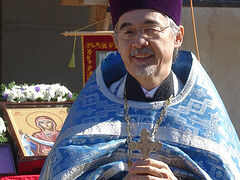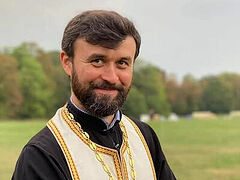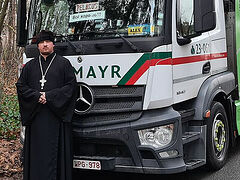 The Anniversary patronal feast in 2019
The Anniversary patronal feast in 2019
—Tell us about the Russian parish of the Holy Apostles Peter and Paul. Let’s start with its history.
—Upon arriving in Luxembourg, the Russian community established a house church in Wiltz in 1927. Fr. George (Sokolov) became its priest, serving until his transfer to Volhynia in 1928. The house church, set up in one of the rooms of the factory canteen, converted into barracks for Russian workers, brought together 175 former cadets and officers employed at the Wiltz tannery on weekends.
The next priest was Fr. Eugene, the former Colonel Treshchin, ordained in Meudon (where we lived) near Paris in 1929. In 1934, the house church moved to Mäertert where it was active until 1966. But over time Fr. Eugene could no longer serve (he died in 1966). Then new priests arrived from Brussels (Fr. Dimitry Khvostov and Fr. Cedomir), and the services continued in premises first provided by the Protestants and then by the Catholics. Fathers Dimitry and Cedomir were succeeded in 1974 by Fr. Sergi Pouh, thanks to whom the parish obtained its own church. Fr. Serge initiated its construction and used his personal funds received from the sale of a house. The church was consecrated on July 12, 1982, in honor of the Holy Apostles Peter and Paul. The frescoes were painted by Archimandrite Cyprian (Pyzhov) of the Holy Trinity Monastery in Jordanville.
—Is the community large today? Does it consist of Russians, or are there representatives of other ethnic groups, including locals?
—We can say that our community is quite large. On the major feasts we have up to 300 people—for us this is a lot. Many travel from the south of Belgium, the west of Germany and France. And our church is quite large.
The community consists mainly of Russians, but Georgians, Serbs, and native citizens of European countries who have converted to Orthodoxy come as well. This is very interesting, and I personally baptized several of these people.
—What motivated those who wished to get baptized?
—It was thanks to their Russian wives. The husbands became interested in Orthodoxy through their spouses and then joined the Church. For example, we have a parishioner from Ukraine. Her husband is a Luxembourger. He gradually converted to the faith through his wife, and I personally baptized him. Now he even takes an active part in parish life.
—What are the distinctive characteristics of your parish life? What language do you use in the services? Are there any local liturgical traditions?
—Our church life is quite developed. I work part-time so I can serve on the twelve great feasts, during Holy Week and on other important days. There are many mixed couples, whose children, although they speak Russian, like listening to the litanies and parts of services in different languages. Now we celebrate the Liturgy with some prayers in French, Serbian, German, English and, of course, Church Slavonic. But this is not an obstacle. People are sympathetic to the fact that services are celebrated in different languages. When St. John of Shanghai was the ruling hierarch of the Diocese of Western Europe, he served in local languages. He served in both French and Flemish... And this didn’t hinder him, because his goal as an archpastor was to spread Orthodoxy. It is important for people to understand the language of services.
—To what extent are the parishioners involved in the life of the community? Do such duties as beautifying the church and financial issues lie entirely on the priest’s shoulders, or do the most active parishioners share the burden of the priest? Can we say that the parish council and assembly are “alive”?
—As elsewhere, there are people, especially women, who take active part in the parish life, but there are not many of them. The church is always clean, and we are constantly engaged in the building maintenance and repairs. I want more people to be involved in this. But people are busy, they have their families and jobs. The church is kept up properly through our efforts. Everyone does their bit and helps as much as possible. There are those who help financially, including large donations (but this is quite rare). People give as much as they can—thank God for that!
Our parish council is alive, and we solve parish problems together. But over the past two years things have somehow come to a halt due to the pandemic. However, the heart of our life is the service.
—When it comes to educational, charitable and social projects, do you manage to do something?
—We have a Sunday school, but it develops with some difficulty because people are poorly integrated into church life. It is hard for parents to understand the importance of raising their children in the Church. But we show understanding to these people, since they are mostly immigrants from the former USSR. But the school is developing despite the complications.
We have limited funds for it social ministry. We help those who ask for aid as much as we can.
We had a project with one parishioner of establishing a center for the study of Orthodoxy and interaction with different parishes from Russia. Unfortunately, this project has almost stopped due to Covid. It is difficult to find funds and space. This worries me a little. After all, we are trying to serve for the glory of God, and in our world that becomes ever more difficult. People have other interests...
We also cooperate with the Russian Center in Luxembourg and take part in events held by the Embassy of the Russian Federation.
—Tell us about the most remarkable events in the life of the parish in recent years.
—Two years ago, we celebrated the ninetieth anniversary of our parish—the date when the first Russian community appeared. This is the most important event.
—Is it possible (and necessary) to interact with representatives of other denominations and religions?
—It’s certainly necessary! Our church was built forty years ago, and soon we will celebrate the anniversary of the event. We obtained the land thanks to the government, which provided us with a parcel, and we were able to build a church. Of course, we participate in various events. On the Luxembourg National Day [public celebration of the Grand Duke’s birthday.—Trans.], local Catholics invite us and representatives of other denominations to the cathedral. In Luxembourg it is important to have contact with representatives of the local religion—that is, with Catholics. I must say that here Catholicism is very strong. By the way, they have helped and are still helping us. We have good relations with them, and we try to maintain these good relations and participate in cultural events in Luxembourg. Local Catholics help not only us, but also Romanians, Serbs and Greeks.
—How are your relations with the State developing? You mentioned that the State provided land for the church. So the authorities help your community, or are there any obstacles?
—Our relations are of an administrative nature. If we want to change something in the church, we need to contact the administration and get permission. We have good relations with them, and they understand us. But they like to be respected, so we should respect Luxembourg and its culture.
—You work. Why aren’t you able to quit your secular job and devote yourself entirely to the ministry? Do you think that a priest should work?
—Orthodox communities in the West are not very rich. Few churches have the means to sustain a priest. I have worked all my life. And many priests work, even though the parish is obligated to support its priest. I work part-time, and the Church pays me a little for my ministry.
Should a priest work? Well, it depends on the particular country and circumstances. A rich parish can give its priest a salary. But the standard of living and prices in Luxembourg are quite high. So we have to work.
—What serious spiritual questions from the parishioners do you as a pastor encounter in your ministry?
—The illness of our century is family relationships. Problems may be very serious: the illness of a spouse or children, divorce... Life may not work out. Poverty is a serious issue as well. Some people come and think they’ll find paradise here. Unfortunately, this is not the case. We try to help people. But, alas, we cannot take everything on ourselves.
—What do you regard as the challenge of the times for an Orthodox person? Perhaps specifically in Luxembourg?
—When teenagers grow up, they leave the Church, and this is very sad for me. It is difficult for parents to make their children go to church. When a child grows up, it’s interesting. During that period in life, a teenager can ask serious questions, and parents can answer them. Unfortunately, this is not the case. I personally encounter similar problems.
—What is the main lesson you have learned over the years of your priestly ministry?
—Our parish is growing; the church is becoming too small for the community. I rejoice! But, alas, only two to three percent of our compatriots are church-goers. The others don’t want to integrate into church life. This is the sad truth of life.
—And our traditional question. What words from the Holy Scriptures or the Holy Fathers especially inspire and support you in difficult moments of life?
—I would quote the words that God spoke to St. Silouan the Athonite: “Keep thy mind in hell and despair not.” This is a difficult idea for everyone. We priests desire people’s eternal salvation, we want people to become active members of the Church. Through spiritual life we become better, and the world around us also becomes better from this. Let’s remember St. Seraphim of Sarov who drew people to him, and people came to him for grace, answers to their questions, and healings. And when we become better, the world around us becomes better as well. This is what I try to explain to those who come to our church. We Christians must make the world a better place!





